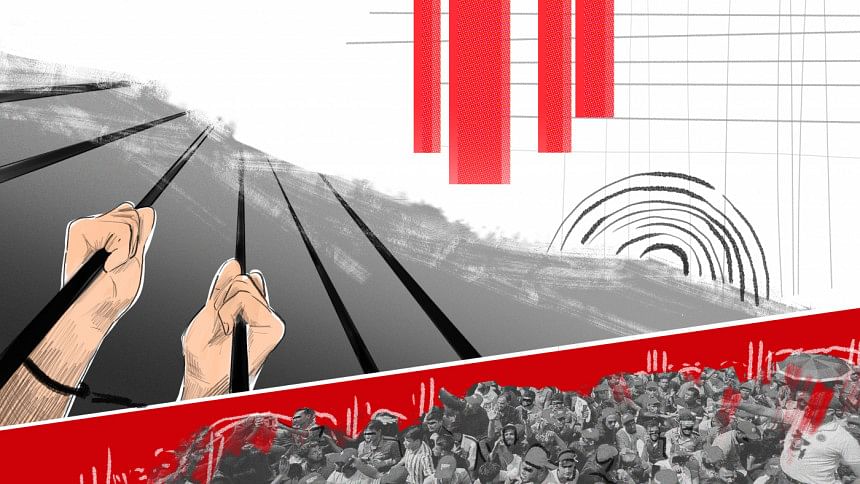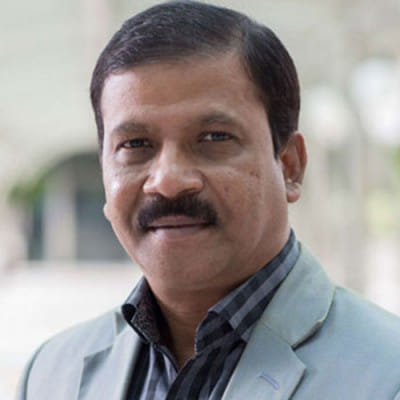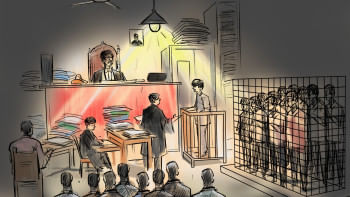Why the hasty delivery of 'justice' for opposition members?

With seven nighttime hearings held over the last two months, and prosecution rushing to finish trials of cases against opposition members before the election, The Daily Star spoke to four experts to gauge the real intention behind this sudden speedy operation of the judiciary.

"The acceleration of the juridical process should be done for all cases. Selective treatment, with some cases remaining pending for years while others move swiftly, is unacceptable. The judicial process should be uniformly fast. The current sudden surge in court activity is indeed surprising. On the other hand, the trial of the seven Narayanganj murder cases was concluded in the lower division court. If it has now moved to the upper division, the government could expedite the proceedings through instructions from the attorney general, especially given that the trial was a highly publicised one. Yet, such cases often remain unresolved for years, raising questions about the consistency of the legal system."
Ali Imam Majumder, Former cabinet secretary

"The entire situation reeks of unethical conduct. What is the reason behind the rush in this step? If it comes from an honest intention, then I have no objection to it. Our courts have operated at night before, even granting bail at times. But often, the lower courts don't start operating on time and lack efficiency. If they can ensure fairness not only in political cases but in all matters and at all times, I'd appreciate that. However, if the intention is to be selective, and favour a specific group or party, then this is condemnable.
Regarding the recent High Court verdict, what I know is that convictions involving moral turpitude can disqualify one from contesting elections. Offences like bribery and cheating fall under this category. Yet, it's worth noting that our national reserves are depleting, and our institutions are growing weaker. Thus, allegations of moral turpitude should increasingly target the current establishment rather than the opposition. This raises questions about the motivations behind these actions."
ZI Khan Panna, Noted Supreme Court lawyer and chairperson of Ain o Salish Kendra (ASK)

"We often speak of an impartial judiciary, but recent events have raised concerns regarding this. It appears that the government is pushing for settlements in cases involving opposition party leaders and organisers. This has led the public to suspect that it might be a tactic to disrupt ongoing protests and the upcoming elections. Additionally, a recent High Court ruling has deemed individuals who have served a two-year prison sentence ineligible for elections. This decision disqualifies many opposition party members who have had legal troubles in the past.
The nature of activities being carried out by the judiciary creates a significant amount of doubt among the public regarding its independence. If the judiciary was investigating all cases equally, then there would not be any space for such doubts. However, it seems their focus is solely on opposition leaders, giving rise to suspicions that the primary goal here is to undermine the ongoing movement and the election. The manner in which these events are unfolding seems unnatural from a democratic point of view as well as from a human rights aspect. Since there is already a lack of protection of human rights and equal treatment for all, such actions are likely to only exacerbate the situation."
Noor Khan Liton, Executive director of Ain o Salish Kendra (ASK) and a human rights activist

"Speedy and public trials in an independent court is a fundamental right of the citizens of Bangladesh. The ultimate end of this constitutional provision is to ensure justice, particularly in criminal cases.
As indicated in the combined reading of the maxims of 'justice hurried, justice buried' and 'justice delayed, justice denied,' speed in conducting trials needs to be 'reasonable' in order to achieve justice. Therefore, if a government singles out politically motivated criminal cases against opposition party members and takes measures to accelerate the trials of only those cases, there may be legitimate reasons for apprehending a miscarriage of justice. Unfortunately, this is what is happening in cases against the BNP and other opposition members, involving arson, explosion, vandalism, and attacks on police.
The process began with the filing of hundreds of suspicious complaints. As documented in a number of investigative reports in the media, numerous gayebi or baseless criminal cases were instituted against opposition members in the last 10 years, particularly in the months before the 2014 and 2018 elections. This trend is being repeated in the current pre-election period as well.
The Daily Star has reported that trials in some such cases are now rolling well into the night. It has confirmed the occurrence of at least seven such nighttime trials between August 28 and October 18—all involving BNP and Jamaat leaders and activists. In addition to these unprecedented nighttime trials, the interval between hearings in those cases has now significantly shortened upon the government's instruction to quickly dispose of these cases.
In another alarming development, the police headquarters has reportedly been instructed to take departmental action if a member of the police fails to give deposition in a criminal case or does not give testimony exactly in accordance with the FIR filed in the criminal cases.
Overall, such measures deliver an ominous message: that the police first have to lodge fictitious cases against opposition members, then give testimony in court in keeping with the phoney details of the complaints, and finally departmental action will be taken against members of police who speak the truth when questioned by the defence counsel or the judge. These would likely result in more convictions of opposition members in police cases based predominantly on the testimony of police.
We have, in the meantime, already read in the newspapers that certain pending cases were speedily settled and a number of central leaders of BNP and many of its activists were sentenced. With the election looming ahead, the above initiatives have apparently been taken to speedily complete the trial of many more such cases ostensibly, in order to punish opposition members. A mid-level police officer told The Daily Star that they have received clear instructions from the government to finish off the trials involving BNP and other opposition parties' leaders before the national election.
BNP leaders allege that the government has made these moves with a dual purpose: first, to keep them in courts so they cannot join the movement for a free and fair election and, second, to imprison their leaders and activists and 'vacate the field' ahead of the general election, which is already being assumed to be conducted like the elections of 2014 and 2018.
These allegations are hard to dismiss as political rhetoric unless the government can justify its categorical enthusiasm in speeding up and dictating the trials of gayebi cases against opposition members. If the trend continues, it will further dent the possibility of a free and fair election taking place come 2024."
Asif Nazrul, Professor of law and researcher on constitutional and environmental laws



 For all latest news, follow The Daily Star's Google News channel.
For all latest news, follow The Daily Star's Google News channel. 









Comments